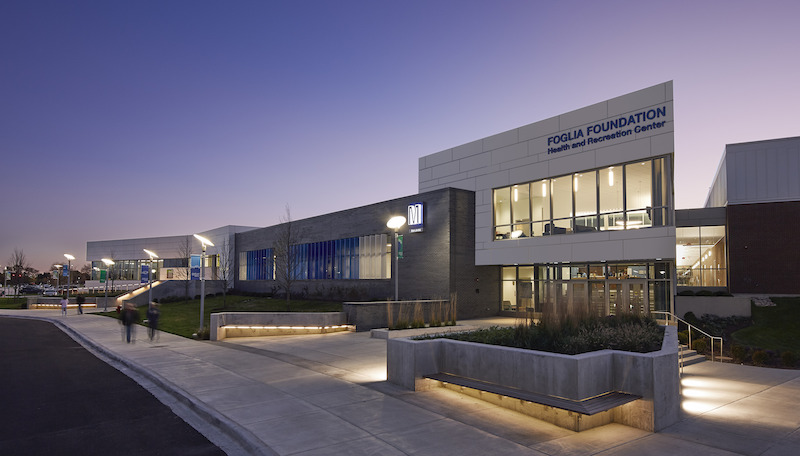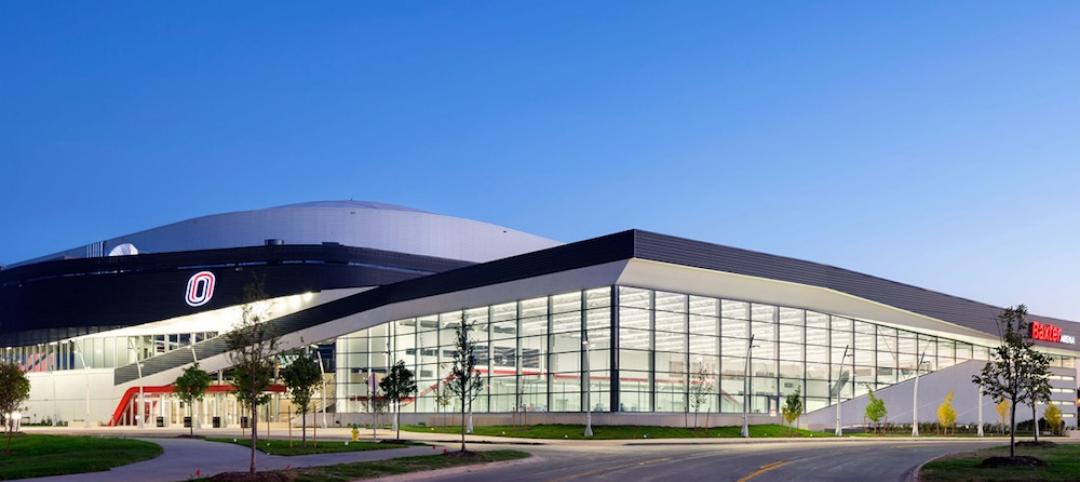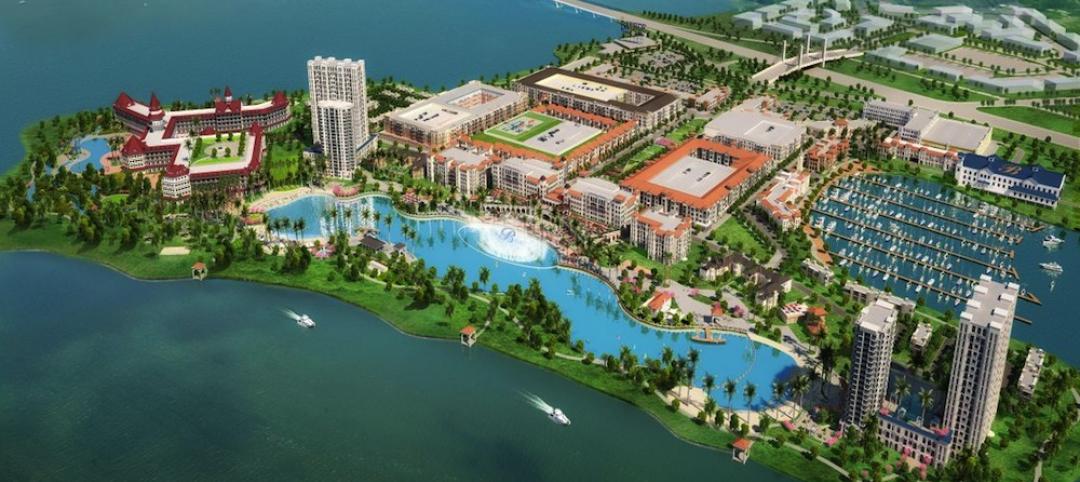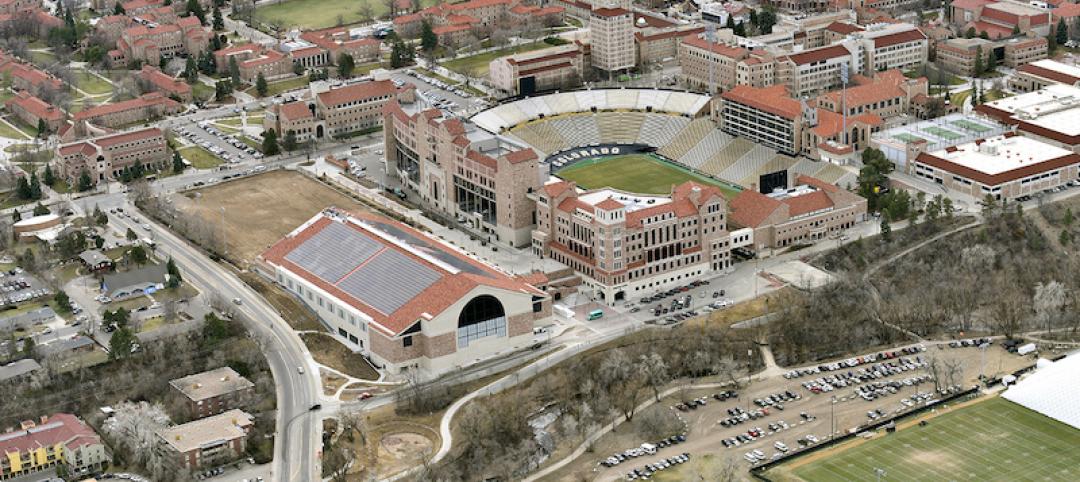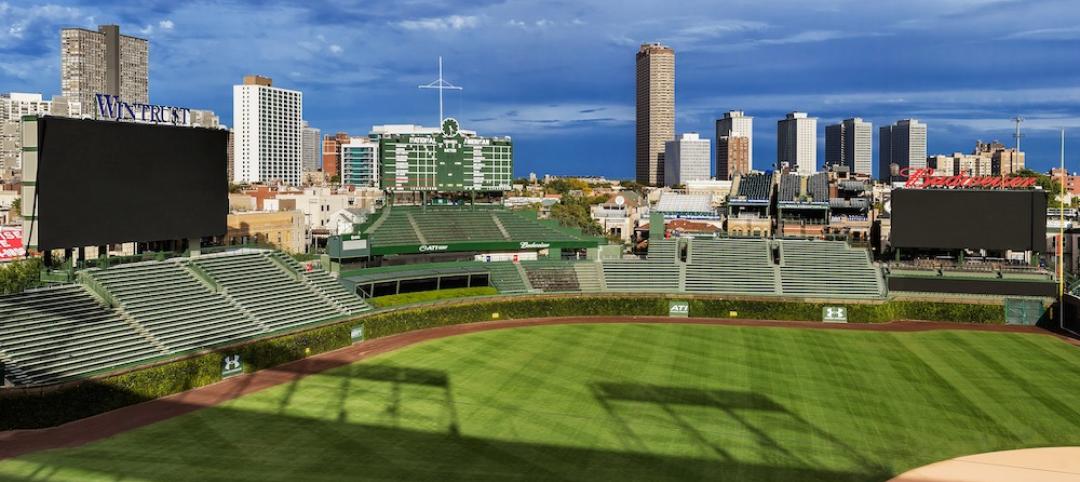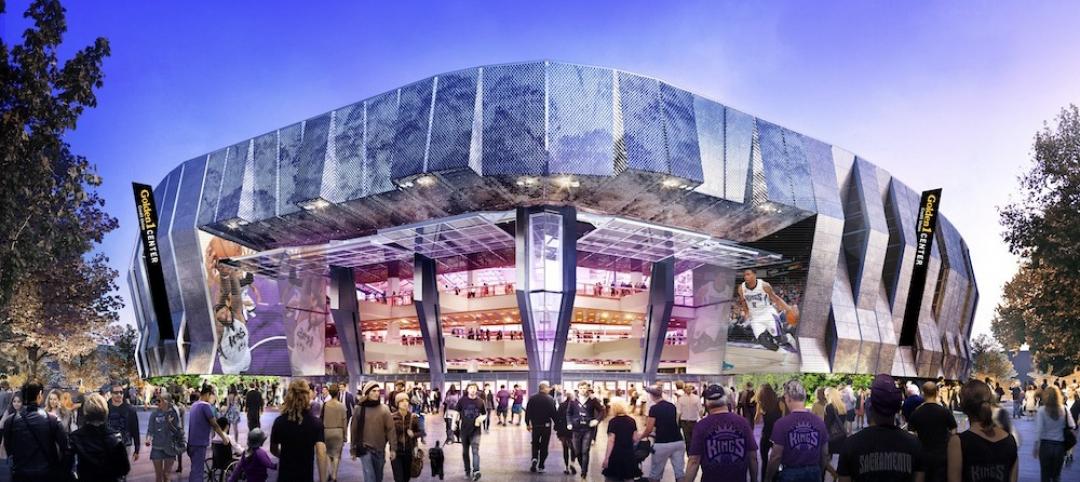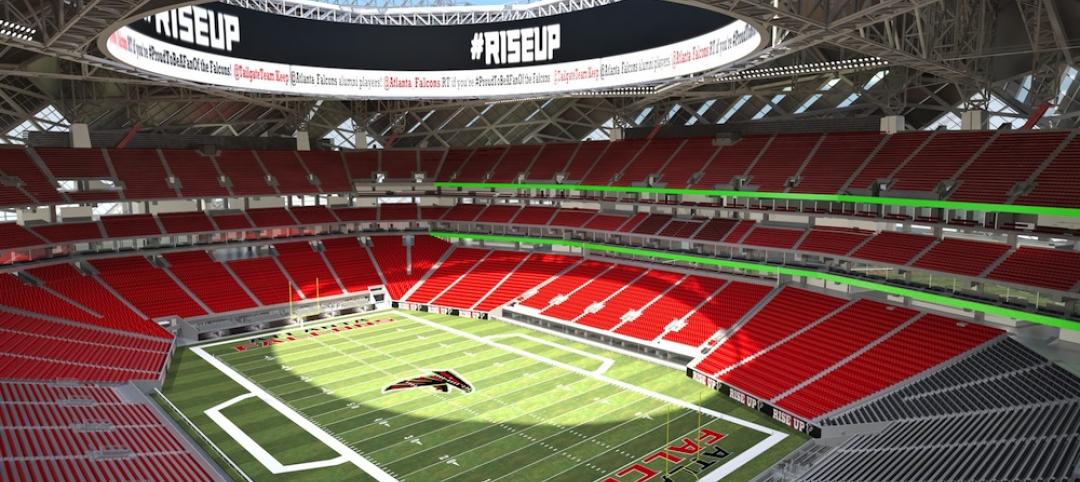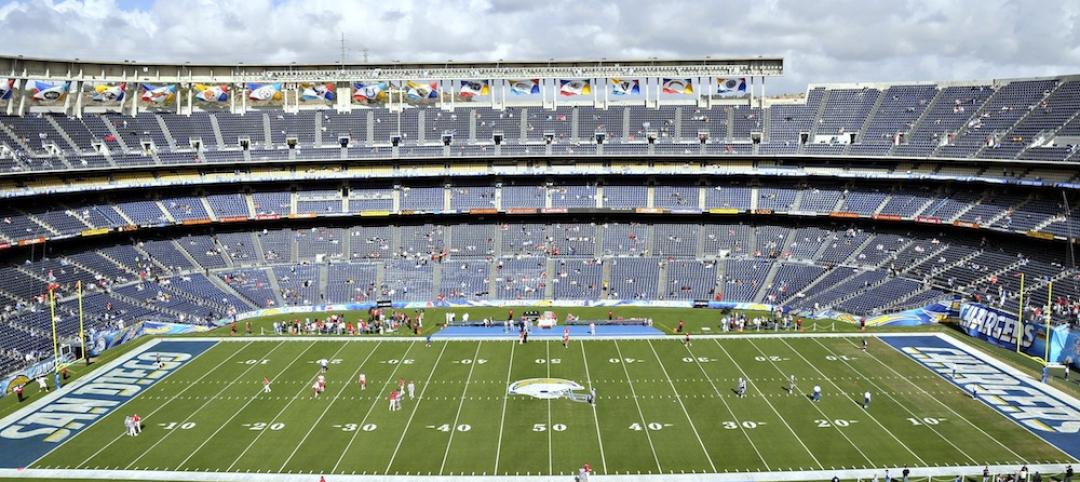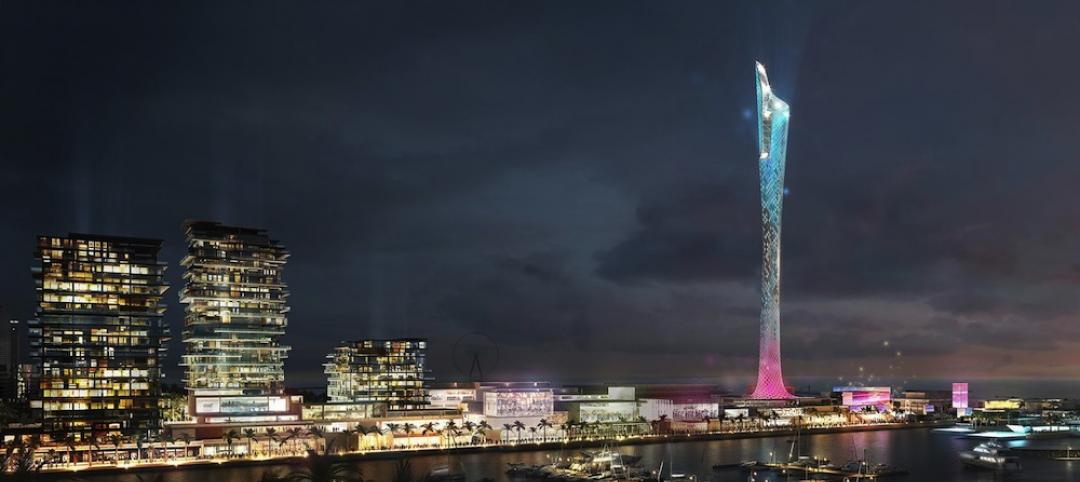Recreation centers keep popping up all over the country. These centers are typically large and expensive to build. Creative financing is often required to get these projects off the ground and to provide the programming that stakeholders want and need.
Take, for example, the 135,000-sf Foglia Foundation Health and Recreation Center at Harper College in Palatine, Ill., which reopened last September after a $41 million renovation of that 40-year-old building, led by designer CannonDesign and construction manager Mortenson.
The community college collaborated on this project with Northwest Community Healthcare, which agreed to pay for the fitout of a new clinic that originally was going to be 5,000 sf but expanded to 10,000 sf, says Steve Paterson, Harper College’s campus architect. The college leases this space, known as the NCH Outpatient Care Center, to the hospital, and its services are available to students, employees, and the community.
The Building Team added 10,000 sf to the rec center to make way for new fitness and exercise rooms, six classrooms, and team training and competition areas, including a new dedicated wrestling room and sports medicine facilities with a hydrotherapy bath. The rec center is also headquarters for the Harper Golden Hawks athletic department and teams.
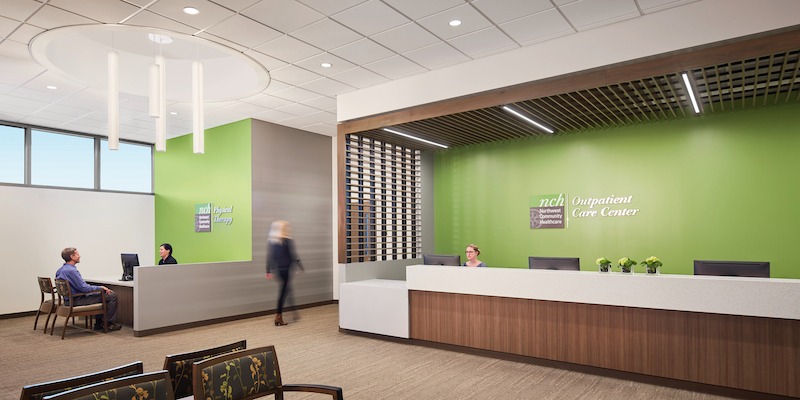
Northwest Community Healthcare agreed to finance the fitout and enlargement of a leased clinic (above) within the Foglia Foundation Health and Rec Center. And the Palatine Parks District contributed to keep the facility's pool open (below), which the district operates. Image: Dave Burk, courtesy of CannonDesign
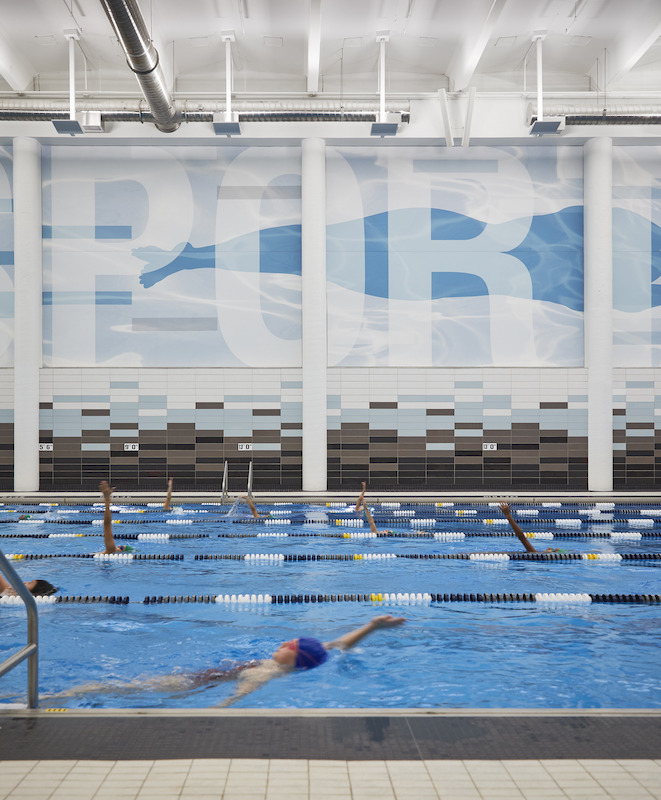
Palatine (Ill.) Park District kicked in $9 million toward the renovation to keep the facility’s pool open. The District operates the pool, says Paterson. whose programming includes aquatic, dance, sports, and fitness activities. “With one facility, we hit the trifecta,” says Mike Clark, the District’s executive director.
“I don’t know if we’ve ever done a project quite like this before,” says Roland Lemke, AIA, LEED AP, Design Principal for CannonDesign, about the way the renovation was funded. He observes that the rec center is mostly used by students during the day and by the community during nighttime hours.
CannonDesign was also involved in the new 120,000-sf Laurier YMCA Athletics and Recreation Centre in Brantford, Ont., which opened on September 14, 2018. The financing for this project came from the Y, the provincial and federal governments, corporate contributions, and Wilfrid Laurier University, whose campus is right next to the Y’s site.
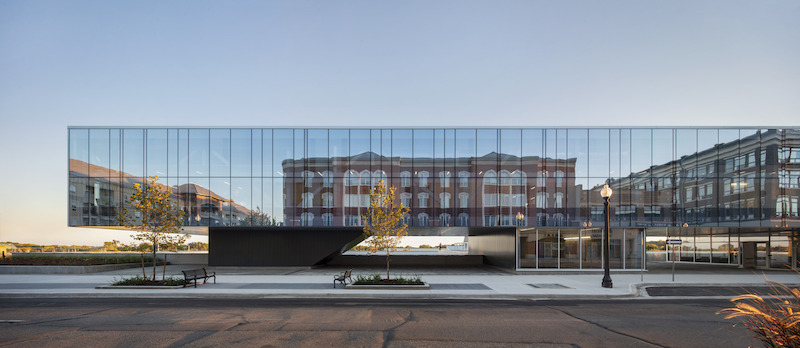
The Laurier Brantford (Ont.) YMCA and Recreational Center, whose nearly 68 million Canadian dollars in funding came from government, academic, and private sources. Image: Adrien Williams, courtesy of CannonDesign
This project had been in the works for at least eight years. Prior to the opening of the new building, the Y had been operating out of a small, temporary space, and the university had “a very small gym” for a student body that had grown to 2,500, say Antonio Araujo and Ulrike Gross, respectively the university’s Active VP-finance and administration and Acting VP-facilities and asset management.
The plans shifted into higher gear two years ago, thanks to 500,000 Canadian dollars in government grant money that paid for the building’s initial design, from which emerged “a rough concept,” says Araujo.
The project appealed to the city of Brantford as a way to help revitalize its downtown, says Genevieve Hladysh, senior regional manager for the Brantford-Hamilton-Burlington YMCA and Recreational Center. The new Y sits on a three-block site on the south side of the city, which tore down 39 mostly vacant retail buildings to clear space for construction. (Araujo and Gross note that the university initially wasn’t all that interested in this site whose main block was entirely below grade.)
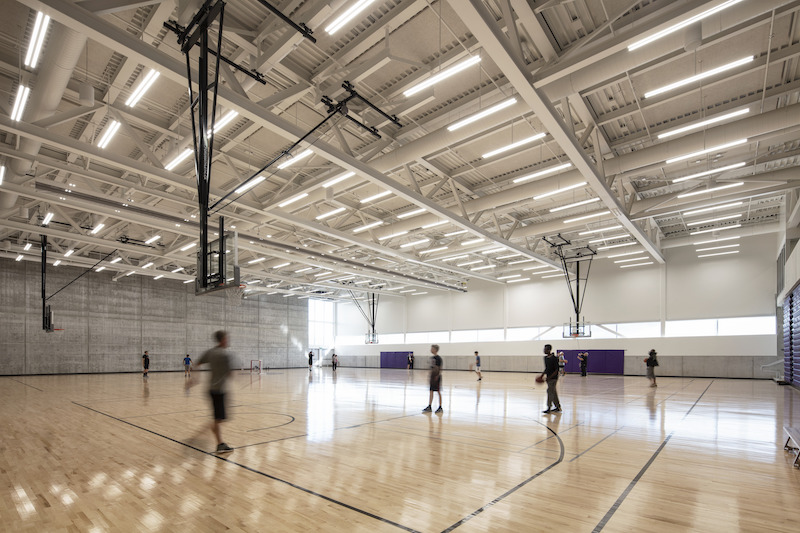
The Brantford YMCA includes a double gym. Image: Adrien Williams, courtesy of CannonDesign
The original budget for the new YMCA was 58.4 million Canadian dollars. But as more funding came on board, the budget rose to 67.7 million Canadian dollars. The federal and provincial governments each contributed C$16.7 million. The city provided $5.2 million, and another C$5.7 million was raised from a community capital campaign. The rest came from the YMCA and Laurier.
The building serves Brantford residents and university students with amenities that include an aquatics center, a double gym with retractable seating for 860 people, health consultation rooms, three studios, student lounge, and a 3,498-sf strength area.
This is the first Y to come together in an integrated space, and while the programming for each stakeholder group is spelled out contractually, “we tried to design the spaces to be as multifunctional as possible,” says Hladysh. Colleen McKenna, LEED AP, firmwide leader for CannonDesign’s sports, rec, and wellness practice, adds that while the university had a “big voice” in the programming, “there was balance and negotiation in the program distribution.”
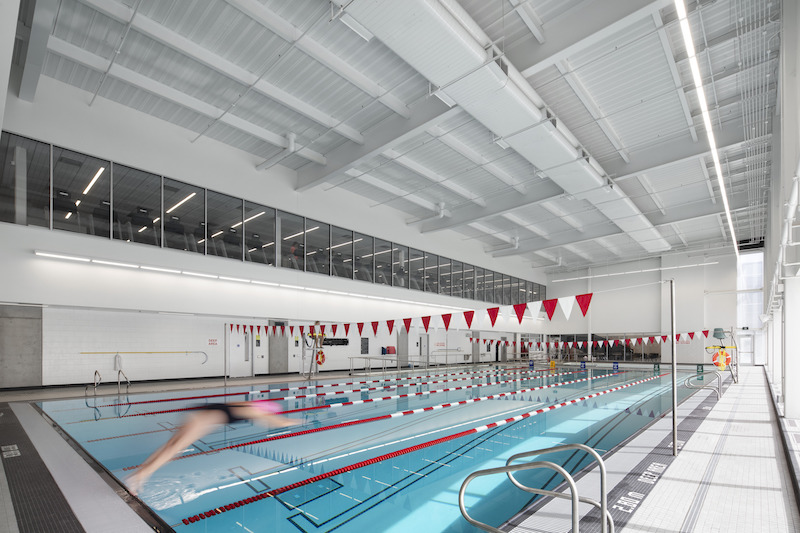
The Y's membership now exceeds 5,300, and its aquatics center is open to students and the community alike. Image: Adrien Williams, courtesy of CannonDesign
Part of the new Y’s increased cost was attributable to the construction unearthing a large archeological find: nearly 440,000 indigenous artifacts that included coins, clothing, and pottery, some of which might date back to 500 BCE. Hladysh says that the YMCA enlisted Six Nations partners to monitor the excavation. She adds that some kind of exhibit space within the new Y is under consideration.
Related Stories
BIM and Information Technology | May 2, 2016
How HDR used computational design tools to create Omaha's UNO Baxter Arena
Three years after writing a white paper about designing an arena for the University of Nebraska Omaha, HDR's Matt Goldsberry says it's time to cherry-pick the best problem-solving workflows.
Mixed-Use | May 1, 2016
A man-made lagoon with a Bellagio-like fountain will be the highlight of a mixed-use project outside Dallas
Construction will soon begin on housing, retail, and office spaces.
Sports and Recreational Facilities | Apr 17, 2016
An expanded and renovated complex brings together U. of Colorado’s sports programs
This two-year project enhances the experiences of athletes and fans alike.
Sports and Recreational Facilities | Apr 13, 2016
Cubs take a measured approach when planning HD video boards
Along with the mammoth and super-sharp video boards, Wrigley Field's 1060 Project includes renovated bleachers, upgraded player amenities, and more concourses, decks, and concessions.
Sports and Recreational Facilities | Apr 13, 2016
More than a game: 4 ways sports teams are adapting to changing fan preferences
As the cost of tickets, parking, and concessions skyrockets, while home theater technology becomes more affordable, fans wonder: Why even bother going to the game? Here’s how progressive sports owners and Building Teams are packing stadium seats.
Sports and Recreational Facilities | Apr 11, 2016
Chicago Cubs continue Wrigley Field renovations with new clubhouse
The team found 30,000 sf of space underneath an old parking lot, nearly tripling the size of the old clubhouse.
Sports and Recreational Facilities | Apr 6, 2016
Las Vegas debuts another new arena, with a number of ‘firsts’
The gambling mecca has its eyes on attracting a pro sports team.
Sports and Recreational Facilities | Apr 5, 2016
The importance of true cost-modeling for sports facilities
Many factors prevent sports facilities from immediate profitability. Rider Levett Bucknall’s Peter Knowles and Steve Kelly write that cost modeling, the process of estimating construction expenses by analyzing fixed and variable expenses, can push facility development to financial success.
Sports and Recreational Facilities | Apr 1, 2016
San Diego Chargers announce plan for downtown stadium and convention center
The project will be funded primarily by a tax increase on hotel stays.
Sports and Recreational Facilities | Mar 31, 2016
An extreme sports tower for climbing and BASE jumping is proposed for Dubai’s waterfront
The design incorporates Everest-like base camps for different skill levels.


